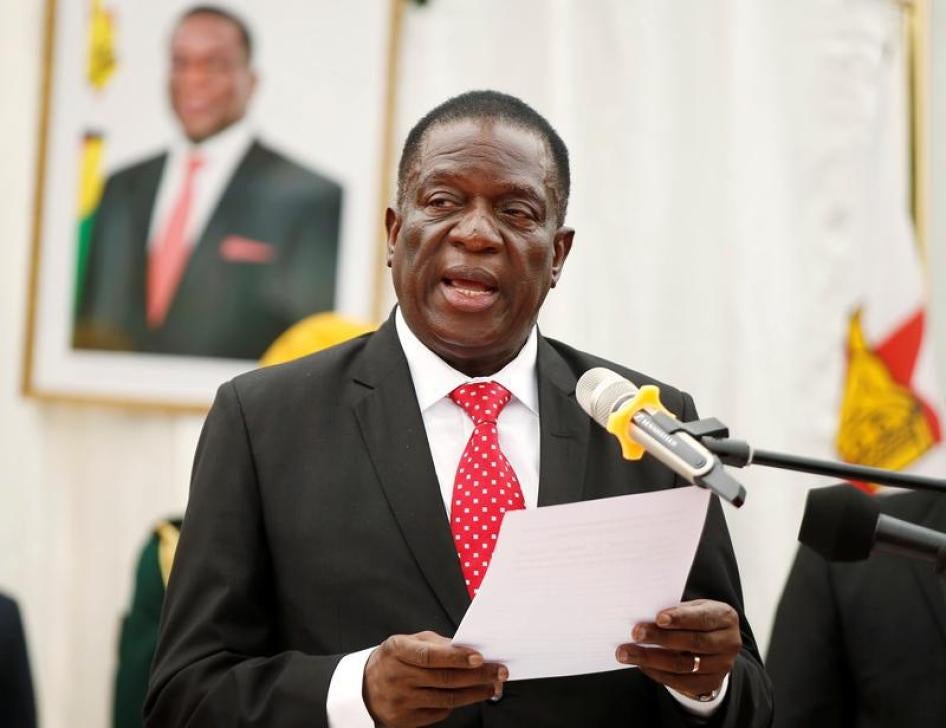Before his resignation, on November 15, Major General Sibusiso B Moyo of the Zimbabwe National Army announced on state television that the military had taken control of all government functions. He said the reason was to deal with “criminal elements” around the then president Mugabe, who he said was safe and that the operation was not a “military takeover.”
These events were set in motion on November 6, when Mugabe fired vice-president Emmerson Mnangagwa from the government, apparently to pave the way for his wife, Grace, to fill the position. The commander of the defence forces, General Constantino Chiwenga, rejected Mnangagwa’s sacking in a November 13 statement, warning the ruling party to stop purges of senior officials with “liberation war credentials”, or the army would step in.
For a people who have suffered repression and other human rights violations amid a deteriorating economy under Mugabe, the news of the end to his rule was received cautiously. The uneasiness and uncertainty may be because of the perception that the military that has taken over is cut from the same cloth as Mugabe when it comes to respect for human rights. As a Zimbabwean national, I have for many years documented the extremely partisan alignment of the security forces’ leadership to Mugabe and the ruling Zanu PF party. It thus came as a surprise that, for the first time, the military leader Chiwenga publicly opposed his commander-in-chief over Mnangagwa’s firing, and made good his threat to take control of the government.
The military takeover, which ended Mugabe’s 37-year authoritarian rule, raises concerns for the country’s future as the military itself has been deeply implicated in human rights violations against civilians over the years. Mugabe actively encouraged the military to be partisan to help him maintain his grip on his party and government. Just like Mugabe before him, Mnangagwa, who has replaced him as president with the backing of the military, is not likely to be independent of the military.
The first post-independence overt military involvement in Zimbabwe’s political affairs was during the period from 1982 to 1987. Mugabe and Zanu PF deployed a section of the army, the Fifth Brigade — a special unit trained by North Korean instructors and code named Gukurahundi (the rain that washes away the chaff) — ostensibly to quell a military mutiny in the Midlands and Matabeleland provinces. The Fifth Brigade carried out widespread abuses, including torture and unlawful killing of an estimated 20 000 people in Matabeleland and Midlands provinces.
In 1988 the Mugabe-led Zanu PF government issued Clemency Order Number 1, granting amnesty to all those involved in human rights violations committed between 1982 and 1987. The beneficiaries were mainly the army and the Central Intelligence Organisation, the state security agency.
The military also interferred in the nation’s political and electoral affairs in ways that adversely affected the ability of Zimbabwean citizens to vote freely. This was particularly evident during the 2008 elections when the army supported widespread and systematic abuses, including political violence, torture and arson, targeting political opponents.
The Joint Operations Command, consisting of Mugabe and heads of the security forces, orchestrated widespread political violence throughout the country against the opposition Movement for Democratic Change (MDC). That violence resulted in the killing of more than 200 people [hrw.org], the beating and torture of 5 000 more, and the displacement of about 36 000 people. Zanu PF-affiliated military leaders who were implicated in the violence and abuses were never held to account. As Mugabe’s enforcer and right-hand man for over 37 years, Mnangagwa is unlikely to press for justice and accountability as president.
In October 2008, soldiers killed more than 200 people [hrw.org] in Chiadzwa, a village in Marange district, eastern Zimbabwe, and violently seized control of the district’s diamond fields. Human Rights Watch investigations showed that the government rotated army brigades into Marange to ensure that the different brigades had an opportunity to benefit from the diamond trade. Soldiers bullied and threatened miners and other civilians into forming syndicates so that the soldiers could control diamond mining and trade in Marange. We also found that the army committed numerous and serious human rights violations, including extrajudicial killings, beatings, torture, forced labour and child labour in Marange.
Mugabe has gone, leaving behind a tattered legacy littered with human rights abuses, but the authoritarian system he built over the years remains intact.
Will Mnangagwa do the right thing to dismantle it — and offer Zimbabwe a new beginning?








